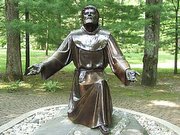‘Viva Christo Re!’
It was a chance remark that was not a chance. A Cuban Jesuit remarked that one of the 498 martyrs beatified last Sunday was a Cuban seminarian studying in Spain at the time when approximately 7,000, including two bishops, were killed in the country’s convents, religious institutions and seminaries.
“He was given the chance of returning to Cuba, but he said that he wanted to stay with his professors and fellow students even if it meant being killed. As he died, he flung up his arms and shouted, ‘Viva Christo Re!’”
“Long live Christ the King!”
This seminarian, whose name I do not know, was so young. How was it that in the few short years that were given him, he reached the point of welcoming martyrdom, turning down the possibility of safety in favour of staying with others whom he knew would also be martyrs? In the inevitable fear of the last few moments of his existence on earth, how did he possess such complete confidence in his Lord that his final words were a declaration of the importance of Jesus, not only in his own life, but, as Christ the King, also important to the whole world?
The decision to remain in Spain during a period of religious persecution, especially when given the chance of freedom and security in his own country, was one that was made in the cold, clear light of reason. Nobody makes such a choice on the spur of the moment. Nobody in their right mind chooses to throw away their own life when it is full of meaning and promise.
Did the young man not think that, if he were to return to Cuba, he could reach his already declared goal of priesthood? Did he not, even briefly, visualise the day of his ordination and imagine himself offering the Eucharist to the people who would attend his Mass? Did he not think of his family, friends and those whom he loved, whom he would not see again in this life?
Of course all those thoughts went through his mind, because if they had not, then he was no martyr: he was a fool who discarded his life in somebody else’s cause. If he were not fully aware of the consequences of his choice, then it was mindless. It was a waste, not a sacrifice, of his young life. He would have stayed with his companions, not because of solidarity in faith and commitment, but because he had followed the herd instinct that we see in cattle or sheep. He did not stay because he was unafraid because courage does not mean fearlessness. Courage means doing what is right in spite of fear. The reckless are not brave.
The decision to stay and face death was made in the cold, clear light of day. The young man did not choose to die, but if death were the consequence of a life given to his Lord, then so be it.
The new Blesseds died such a short time ago in 1936. Their relatives and friends were amongst the 70,000 in St. Peter’s Square. What were their thoughts? How many of the thousands present would have chosen to act in the same way as the young seminarian? We do not know. The vast majority of us will never be put to that sort of test. We are, however, all called to give our lives for Christ the King. That is why today is the feast of All Saints, those living and those who have died and have gone home before us.
‘Viva Christo Re!’
God bless,
Sr. Janet

